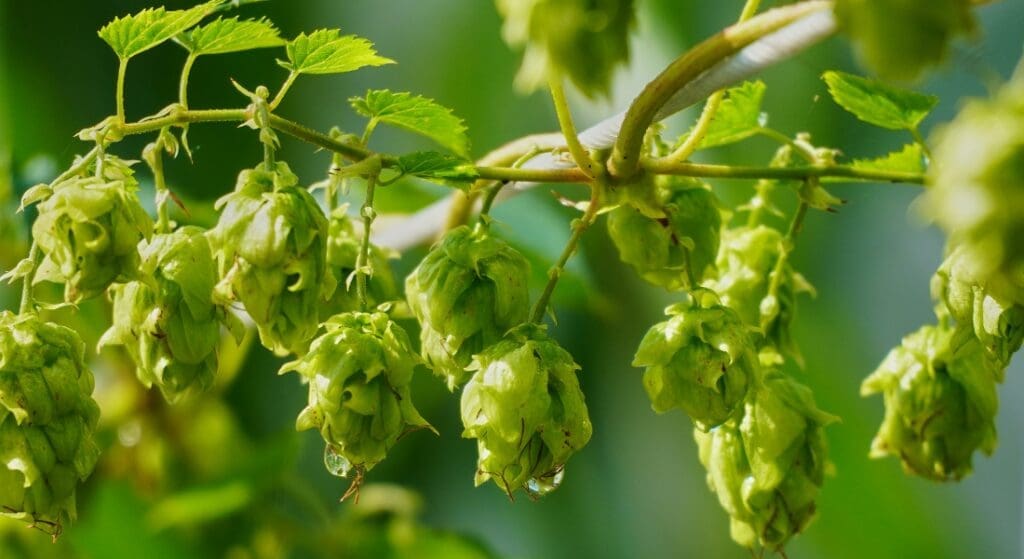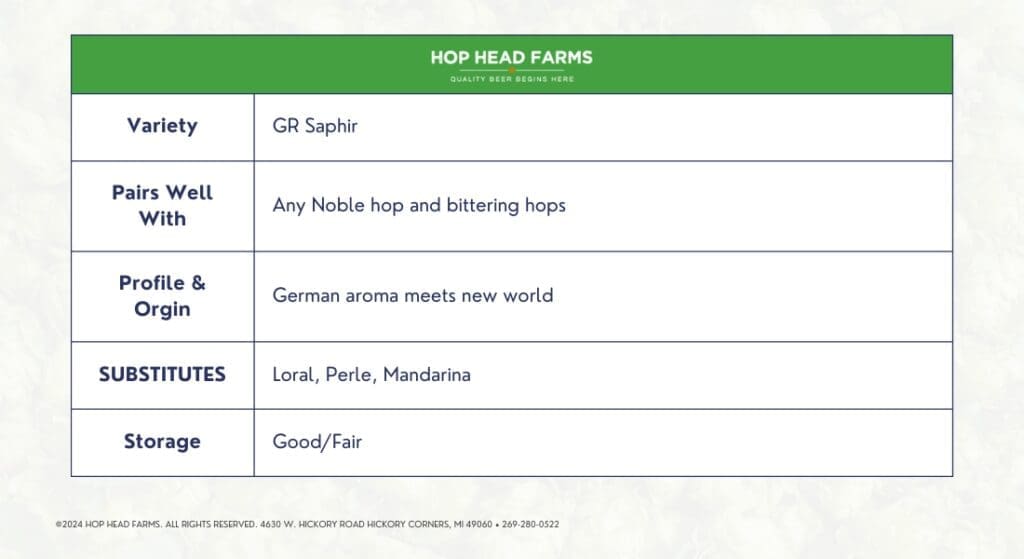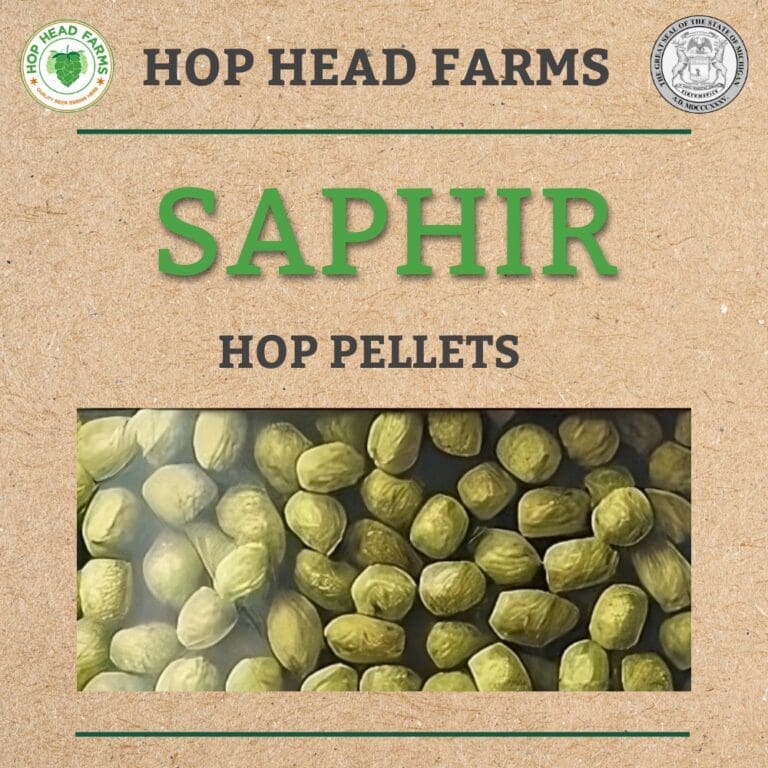Saphir hop, a prized variety from Germany, has gained recognition among brewers for its unique aroma and versatile profile. Whether you’re a seasoned brewer or an enthusiastic beer aficionado, understanding the characteristics and uses of Saphir hops can elevate your brewing game. This article dives deep into the essence of Saphir hops, exploring their origin, flavor profile, and brewing applications, making it a must-read for anyone looking to craft exceptional beers in 2023.
What Are Saphir Hops?
Saphir hops are a noble variety originating from Germany, known for their mild and pleasant aroma. Released in 2002 by the Hop Research Center in Hüll, Saphir hops have quickly become a favorite among brewers for their refined citrus notes and subtle spice.
The Saphir hop offers a balanced bitterness with low cohumulone content, making it an excellent choice for a variety of beer styles. This hop is particularly noted for its versatility in brewing, contributing to both the aroma and flavor profile of the beer.

The Origin and History of Saphir Hops
Saphir hops were bred at the Hop Research Center in Hüll, Germany, and were officially released in 2002. This hop variety was developed as an alternative to Hallertau Mittelfrüh, to provide similar noble characteristics while offering enhanced disease resistance and yield.
The breeding process focused on creating a hop with a distinct aroma profile, featuring elements of citrus and spice, making it well-suited for both traditional and modern beer styles. Since its release, Saphir has been embraced by brewers worldwide, particularly for its unique flavor contributions and reliable performance in the brew house.

The Unique Flavor and Aroma Profile of Saphir Hops
Saphir hops are celebrated for their distinctive flavor and aroma profile. They feature refined citrus notes, particularly tangerine, combined with subtle hints of spice and fruit. This complex combination makes Saphir hops ideal for adding a nuanced, aromatic quality to various beer styles.
The alpha acids in Saphir hops typically range from 3% to 5%, providing a mild bitterness that complements its aromatic properties. Brewers often describe Saphir’s aroma as pleasantly floral, with herbal and fruity undertones that enhance the overall sensory experience of the beer.
How Saphir Hops Enhance Different Beer Styles
Saphir hops are versatile, making them suitable for a wide range of beer styles. They are particularly well-suited to Belgian whites and pilsners, where their mild bitterness and aromatic qualities can shine. The refined citrus notes and elements of spice and fruit amid the hops contribute to a balanced and refreshing flavor profile.
In addition to Belgian whites and pilsners, Saphir hops are also used in various lagers, ales, and even some wheat beers. Their ability to blend seamlessly with other hop varieties and malt profiles allows brewers to experiment and create unique flavor combinations.
Brewing with Saphir Hops: Tips and Techniques
When brewing with Saphir hops, it’s important to consider the hop additions and timing to maximize their aromatic and flavor contributions. Due to their low cohumulone content, Saphir hops are ideal for late boil additions, whirlpool, and dry hopping.
For those looking to highlight the aromatic qualities of Saphir hops, adding this beer hops towards the end of the boil or during fermentation can help preserve their delicate citrus and spice notes. Combining Saphir with other noble hops or complementary varieties can also enhance the complexity and depth of the beer.
Saphir Hop Substitution: What You Need to Know
If you’re unable to source Saphir hops, there are several suitable substitutions that can achieve a similar flavor and aroma profile. Hallertau Mittelfrüh, Tettnang, and Saaz are often recommended as alternatives due to their noble characteristics and aromatic qualities.
When substituting Saphir hops, it’s crucial to consider the alpha acid content and adjust the hop additions accordingly to maintain the desired bitterness and flavor balance in the beer.
The Role of Saphir Hops in German Lagers
Saphir hops play a significant role in German lagers, contributing to their distinctive taste and aroma. The mild bitterness and refined citrus notes of Saphir hops complement the clean, crisp malt profile of traditional German lagers, creating a harmonious and well-rounded beer.
Brewers often use Saphir hops in conjunction with other German hop varieties to achieve a balanced hop profile that enhances the overall drinkability and complexity of the lager.
Saphir Hops: Recent Trends and Insights
Saphir hops continue to be a popular choice among brewers looking to create innovative and flavorful beers. Recent trends indicate an increased interest in using Saphir hops for their aromatic qualities, particularly in dry hopping and late boil additions.
Brewers are also exploring new combinations and techniques to highlight the unique characteristics of Saphir hops, resulting in exciting and diverse beer offerings that appeal to a wide range of palates.
Where to Source High-Quality Saphir Hops
Finding high-quality Saphir hops is essential for achieving the best brewing results. At Hop Head Farms, we offer Saphir hops that are carefully harvested and processed to preserve their aromatic properties. We pride ourselves on providing the freshest and most aromatic hops available.
In addition to offering high-quality hops, we also provide bulk purchasing options for brewers. By buying in bulk, you can ensure a consistent supply of premium Saphir hops for your brewing needs. When sourcing Saphir hops, it’s important to consider factors such as crop year, harvest quality, and storage conditions, and at Hop Head Farms, we take these elements into account to deliver the best hops possible.
Key Takeaways
- Saphir hops are a noble variety from Germany, known for their refined citrus notes and subtle spice.
- Released in 2002 by the Hop Research Center in Hüll, Saphir hops offer a balanced bitterness with low cohumulone content.
- They are versatile and can be used in a variety of beer styles, including Belgian whites, pilsners, lagers, and ales.
- Brewing with Saphir hops involves careful timing of hop additions to preserve their aromatic qualities.
- Suitable substitutes for Saphir hops include Hallertau Mittelfrüh, Tettnang, and Saaz.
- Sourcing high-quality Saphir hops from reputable suppliers is essential for achieving the best brewing results.
By understanding and utilizing the unique characteristics of Saphir hops, brewers can create exceptional beers that delight the senses and stand out in a competitive market.






